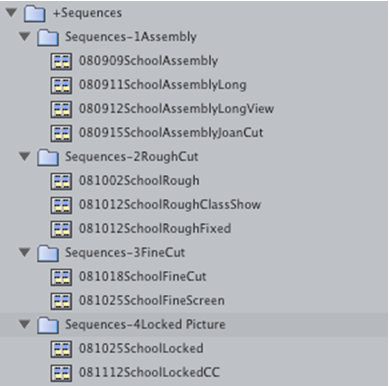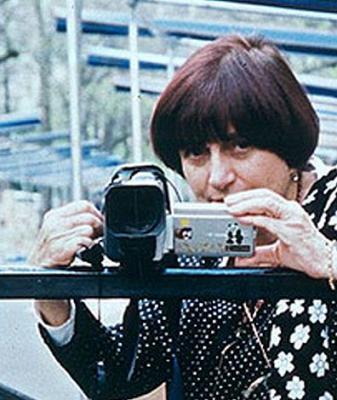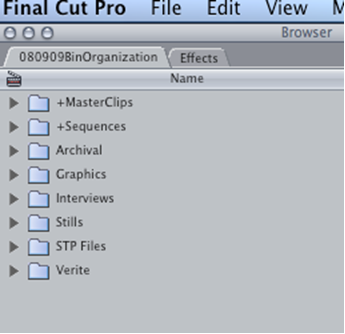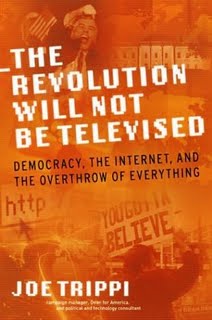Our Blog
Blog
Blog
Survey on Hiring Documentary Film Editors
November 12, 2009
I am interested in conducting an informal survey on the fee structure for hiring an editor to cut a documentary film. This isn’t about rates per se. Given our changing economic landscape, I’m curious to know if other documentary editors and producers are charging/paying for editing services by the hour (or day or week) or by the job? Every editor I personally know charges by the hour, day or week–in other words, for a set increment of time. However, I have met producers who expect to pay a set amount to get an editing job done. (Usually they are not…
Read More...Best Practices for Naming Sequences
November 11, 2009
I began hunting for a systematic way to organize sequences soon after I began teaching in the documentary program at UC Berkeley. I noticed that many students were labeling their sequences “final”. The problem with that nomenclature is that there was inevitably one more or more “final final”, creating havoc when I attempted to grade or the class tried to assemble a show. One student labeled his sequences “Final Uno”, “Final Duo,” “Final Tres, etc” to help me out. Then, during a tour of Current TV’s production studios in San Francisco, I encountered a brilliant method for naming sequences and…
Read More...
Episodic Story Structure in “The Beaches of Agnes”
November 10, 2009
I saw The Beaches of Agnes last weekend, a quirky personal documentary directed by Agnes Varda, a French artist and filmmaker (The Gleaners and I, 2000). The film was visually interesting, and Agnes herself, an 80-year-old warm woman, was an appealing character. But frankly I had a hard time staying engaged as Agnes revealed one mostly unrelated episode after another. I felt like I was reading a novel with long passages of landscape and character descriptions that never seemed to get going. I even felt a guilty that I was bored. The problem, I surmised as I half-watched the screen,…
Read More...
Organizing Your Bins Effectively
November 5, 2009
The majority of non-linear editing systems employ a bin or folder method to help editors organize their footage. This chapter displays screenshots of the Final Cut Pro Studio Browser window, but it is easy to duplicate this strategy in other software programs. Planning your organizational strategy before you start ingesting footage is critical, and for the anal, left-brained editing geeks among us, myself included, this will be fun. For the rest of you, remember that having a clear structural hierarchy for your clips will save you time and money in the editing process, particularly if you have to change editors…
Read More...
What is Your Documentary Film’s Central Question?
November 4, 2009
I used to think of a film’s central question as a thematic, probing query, such as “How can humans stop war?” or “Why is jealousy a sanctioned emotion in monogamous relationships?” But those kind of questions are far too existential for most character-driven documentary films. Think more practically, as screenwriters do. Will Romeo and Juliet stay together? Will the sheriff kill the shark? Will the Jordan family save their farm? The central question is always some variation of the question, “Will the protagonist reach his goal?” A documentary’s inciting incident gives rise to the protagonist’s quest-alternately called the “hero’s journey”…
Read More...
Contriving the Plot for a Personal Documentary
November 3, 2009
I noticed that a recent New York Times book review of the book No Impact Man (10/18/09), made a salient point that could easily be applied to personal documentaries. Reviewer Alexandra Jacobs says, “The book exemplifies an increasingly popular subgenre that involves setting oneself a task, usually for a year, and writing about it in an online diary before committing the account between covers.” She also point out that “the approach has its advantages: narrative boundaries are clearly defined; an author can build a following; live reader form feedback informs his ideas.” A similar trend is underway in the genre…
Read More...
Using Sounbites for Your Documentary’s Inciting Incident
October 29, 2009
Once my students understand the necessity of an inciting incident to launch their story, their next question is this: “If a documentary filmmaker does not have footage of the actual inciting incident, how does she bring it to life on screen?” The most common solution in the documentary world is to comb through interviews for a soundbite that reconstructs the inciting incident. Sometimes even a periphery character can recall a particular moment that will change the lives of the characters forever. In Capturing the Friedmans, an 88-minute film, the inciting incident occurs seven minutes into the story, when a postal…
Read More...
Getting Lucky With Your Documentary Film’s Inciting Incident
October 28, 2009
Hollywood screenwriters follow a rule about the inciting incident: this pivotal scene must be visually depicted on screen, preferably in present story time. In other words, the inciting incident plays such a critical function in the overall story structure that the story the writer cannot revert to launching the film through exposition (boring) or backstory (too removed). Of course, this imperative presents a major problem for documentary filmmakers constructing a narrative arc. Frequently, by the time a documentary filmmaker gets interested in a film, the inciting incident has already happened. And it’s unlikel that the scene was caught on film.…
Read More...
Posing A Documentary’s Central Question
October 27, 2009
In character-driven documentary’s, the inciting incident gives rise to the protagonist’s quest-alternately called the “hero’s journey” or “object of desire”-as well as formulating the film’s central question. Will Romeo and Juliet stay together? Will the sheriff kill the shark (Jaws)? Will the Jordan family save their farm? (Troublesome Creek). The central question is always some variation of the question, “Will the protagonist reach his goal?” After a long period of struggle in Act Two, this central question is finally answered for better or worse in Act Three, at or just following the film’s climax. Like narrative films, documentaries are at…
Read More...
How to Find A Good Story Consultant
October 22, 2009
Here’s part 3 of my column in SF360’s “The Edit Room” about hiring a story consultant. (http://www.sf360.org/indie-toolkit/itk-how-a-story-consultant-saved-me ) When is the best time to hire a story consultant? I get this question a lot. Ideally you’ll hire a story consultant for a day during pre-production, when you are determining the story potential or essay components of your film. They will be able to assess the story strength of the film you have in mind, and offer suggestions for the kinds of scenes and sound bites you need to capture during filming. Television acquisition executives and audiences want compelling stories. And story…
Read More...